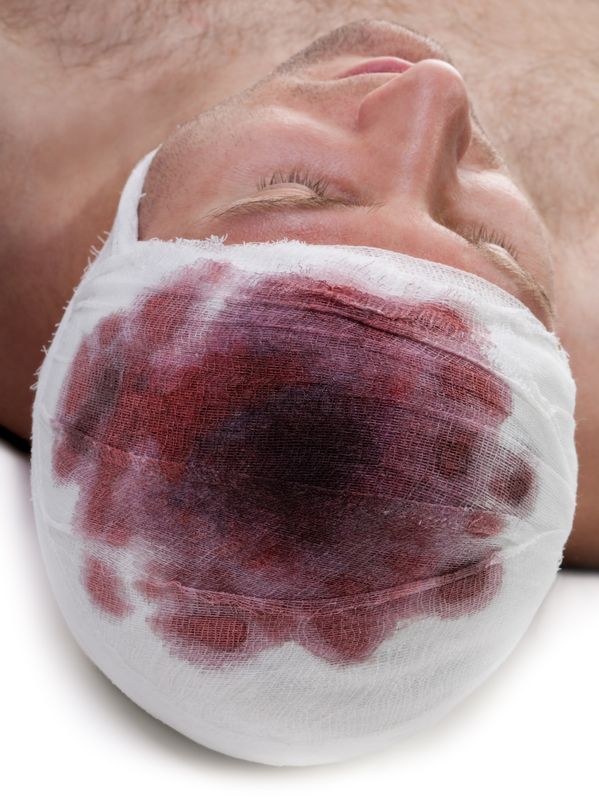Shared by Attorney William Bill Hurst
Source: Web MD
The most common and least serious type of traumatic brain 
According to the CDC, as many as 3.8 million sports- and recreation-related concussions occur each year in the U.S. Other causes include car and bicycle accidents, work-related injuries, falls, and fighting.ou tell if you have had a concussion? Is it always serious? And what should you do if you have a concussion? Here are answers to some important questions about concussions.
What Is a Concussion?
As seen in countless Saturday morning cartoons, a concussion is most often caused by a sudden direct blow or bump to the head.
The brain is made of soft tissue. It’s cushioned by spinal fluid and encased in the protective shell of the skull. When you sustain a concussion, the impact can jolt your brain. Sometimes, it literally causes it to move around in your head. Traumatic brain injuries can cause bruising, damage to the blood vessels, and injury to the nerves.
The result? Your brain doesn’t function normally. If you’ve suffered a concussion,vision may be disturbed, you may lose equilibrium, or you may fall unconscious. In short, the brain is confused. That’s why Bugs Bunny often saw stars.
Can Children Have Concussions?
Because their heads are disproportionately large compared to the rest of their body, concussions often occur in young children. As kids enter adolescence, they experience rapid height gain. Both are factors that make them more prone to accidents than adults.
According to the National Dissemination Center for Children with Disabilities, 1 million children each year suffer concussions. More than 30,000 incur long-term disabilities as a result of the traumatic brain injury.
If a child has a concussion, an adult should monitor him or her for the first 24 hours. It’s important to watch for behavioral changes. Young children, especially, may not be able to fully communicate what they are feeling, so it is critical to watch them closely. Do not give medications including aspirin, which may cause bleeding, to a child without consulting a doctor.
What Are the Signs of a Concussion?
Concussions can be tricky to diagnose. Though you may have a visible cut or bruise on your head, you can’t actually see a concussion. Signs may not appear for days or weeks after the injury. Some symptoms last for just seconds; others may linger.
Concussions are fairly common. Some estimates say a mild brain trauma is sustained every 21 seconds in the U.S. But it’s important to recognize the signs of a concussion so you can take the proper steps to treat the injury.
There are some common physical, mental, and emotional symptoms a person may display following a concussion. Any of these could be a sign of traumatic brain injury:
- confusion or feeling dazed
- clumsiness
- slurred speech
- nausea or vomiting
- headache
- balance problems or dizziness
- blurred vision
- sensitivity to light
- sensitivity to noise
- sluggishness
- ringing in ears
- behavior or personality changes
- concentration difficulties
- memory loss
What are the Different Types of Concussions?
Concussions are graded as mild (grade 1), moderate (grade 2), or severe (grade 3), depending on such factors as loss of consciousness, amnesia, and loss of equilibrium.
In a grade 1 concussion, symptoms last for less than 15 minutes. There is no loss of consciousness.
With a grade 2 concussion, there is no loss of consciousness but symptoms last longer than 15 minutes.
In a grade 3 concussion, the person loses consciousness, sometimes just for a few seconds.
What Should I Do if I Have a Concussion?
The seriousness of a concussion dictates what kind of treatment you should seek. Most people with concussions fully recover with appropriate treatment. But since a concussion can be serious, safeguarding yourself is important. Here are a few steps to take:
- Seek medical attention. A health care professional can decide how serious the concussion is and whether you require treatment. If you have suffered a grade 1 or grade 2 concussion, wait until symptoms are gone before returning to normal activities. That could take several minutes, hours, days, or even a week.
If you have sustained a grade 3 concussion, see a doctor immediately for observation and treatment. A doctor will ask how the head injury happened and discuss the symptoms. The doctor may also ask you simple questions such as “Where do you live?,” “What is your name?” or “Who is the president?” The doctor asks these questions to evaluate memory and concentration skills.
The doctor may test coordination and reflexes, which are both functions of the central nervous system. The doctor may also order a CT scan or an MRI to rule out bleeding or other serious brain injury.
If hospitalization is not required, the doctor will provide instructions for recovery. Aspirin-free medications may be prescribed and you will be advised to take it easy. Experts recommend follow-up medical attention within 24 to 72 hours if symptoms worsen.
- Take a break. If your concussion was sustained during athletic activity, stop play and sit it out. Your brain needs time to properly heal, so rest is key. Definitely do not resume play the same day. Athletes and children should be closely monitored by coaches upon resuming play. If you resume play too soon, you risk a greater chance of having a second concussion, which can compound the damage. The Amer. academy of Neurology has issued guidelines about resuming activities after a concussion.
- Guard against repeat concussions. Repeat concussions cause cumulative effects on the brain. Successive concussions can have devastating consequences, including brain swelling, permanent brain damage, long-term disabilities, or even death. Don’t return to normal activities if you still have symptoms. Get a doctor’s clearance so you can return to work or play with confidence.
Can I Prevent a Concussion?
By its very nature, a concussion is unexpected, so it is tough to prevent. But there are several commonsense precautions you can take to lessen the possibility of traumatic brain injury.
- Wear protective equipment. Participation in high-contact, high-risk sports such as football, hockey, boxing, and soccer can increase the likelihood of a concussion. Skateboarding, snowboarding, horseback riding, and roller blading are also a threat to your brain’s health. Wearing headgear, padding, and mouth and eye guards can help safeguard against traumatic head injuries. Wearing a bike helmet can lower the risk of traumatic head injury by 85%. Ensure that the equipment is properly fitted, well maintained, and worn consistently.
- Drive and ride smart. Always wear a seatbelt, obey posted speed limits, and don’t use drugs or alcohol because they can impair reaction time.
- Don’t fight. Concussions are often sustained during an assault, and more males than females report traumatic head injuries.
Hire An Attorney
If you or a family member have been injured in an accident and experienced a head injury call an experienced Personal attorney, William Bill Hurst at 800-636-0808 for your free consultation.




